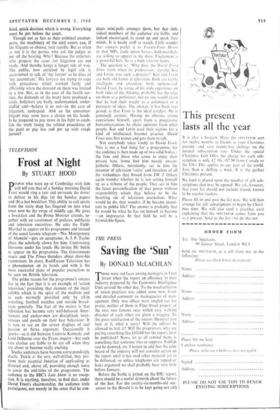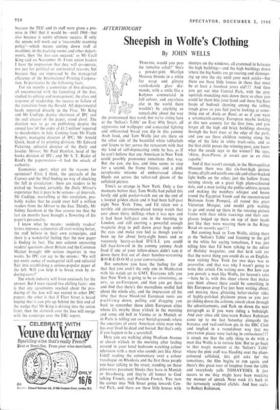Saving the 'Sun'
THE PRESS By DONALD McLACHLAN rrMERE were red faces among managers in Fleet I Street when the report on efficiency in their industry prepared by the Economist Intelligence Unit arrived the other day. To the usual criticism of union practices was added some new, frank and detailed comment on inadequacies of man- agement. Only two offices were singled out for praise, neither of them in Fleet Street proper; of the rest, two famous ones within easy walking distance of each other are given a wigging. To the great satisfaction of the unions. However you look at it, what a story! Will the editors be allowed to leak it? Will the proprietors, who are paying something like £10,000 for the report, let it be published? News, let us all remind them, is something that someone tries to suppress. Publish and be damned, etc. I hasten to add that the joint board of the industry will not consider action on the report until it has read other material yet to be delivered; so unless telephones are tapped or leaks organised we shall probably hear very little before January.
Before the battle is joined on the EIU report, there should be a useful skirmish about the future of the Sun. For the twenty-six-months-old suc- cessor to the Herald is to be kept going not only
because the TUC and its staff were given a pro- mise in 1961 that it would be—until 1968—but also because it scents ultimate success. If only the unions will work out a 'reasonable manning policy'—which means cutting down staff at machines, in the packing rooms and other depart- ments, then 'the Sun can succeed,' as Mr Cecil King said on November 16. From union leaders I have the impression that they will co-operate, not just for political or sentimental reasons, but because they are impressed by the managerial efficiency of the International Printing Corpora- tion. In particular by the following facts.
For six months a committee of five directors, all unconnected with the launching of the Sun, studied its editing and management, the class and response of readership, the success or failure of the transition from the Herald. All departmental heads reported directly to the Five; Mr King and Mr Cudlipp, deputy chairman of IPC and the real creator of the paper, stood aloof. The decision was to go on publishing despite the annual loss 'of the order of £1.5 million' reported to shareholders in July. Coming from Mr Frank Rogers, managing director of IPC; Mr Arnold Quick, head of its printing division; Mr Edward Pickering, editorial director of the Daily and Sunday Mirror; Mr Paul Hamlyn, head of the books division of IPC; and Mr S. T. Ryder of Reed's the papermakers—it had the smack of authority.
Economies apart, what are the reasons for optimism? First, I think, the spectacle of the Express and the Mail finding no way of checking the fall in circulation : there are readers to be picked up. Second, certainly, the Daily Mirror's experience that it pays to be serious—at intervals. Mr Cudlipp, marvelling at this revelation, pro- bably wishes that he could steer half a million readers from the Mirror to the Sun. Thirdly, Mr Sidney Jacobson at the Sun assures me that the last six months have brought a flowering of his paper's personality.
I know what he means: suddenly readers' letters improve, columnists all start writing better, the staff believe in their own campaigns, and there is a wonderful feeling that the new paper is finding its feet. The new column answering readers' questions about Britain and the Common Market brought 400 serious inquiries in two weeks. So IPC can say to the unions: 'We will put every ounce of managerial skill and editorial flair into establishing a serious-popular paper of the left. Will you help it to break even by re- ducing costs?'
The whole industry will listen anxiously for the answer. But I must record two chilling facts : one is that any agreements reached about the pro- ducing of the Sun will not extend to other IPC papers; the other is that if Fleet Street is heard hoping that it can pile up behind the thin end of the wedge that Mr King is driving into the union front, then the skirmish over the Sun will merge with the campaign over the EIU report.



































 Previous page
Previous page